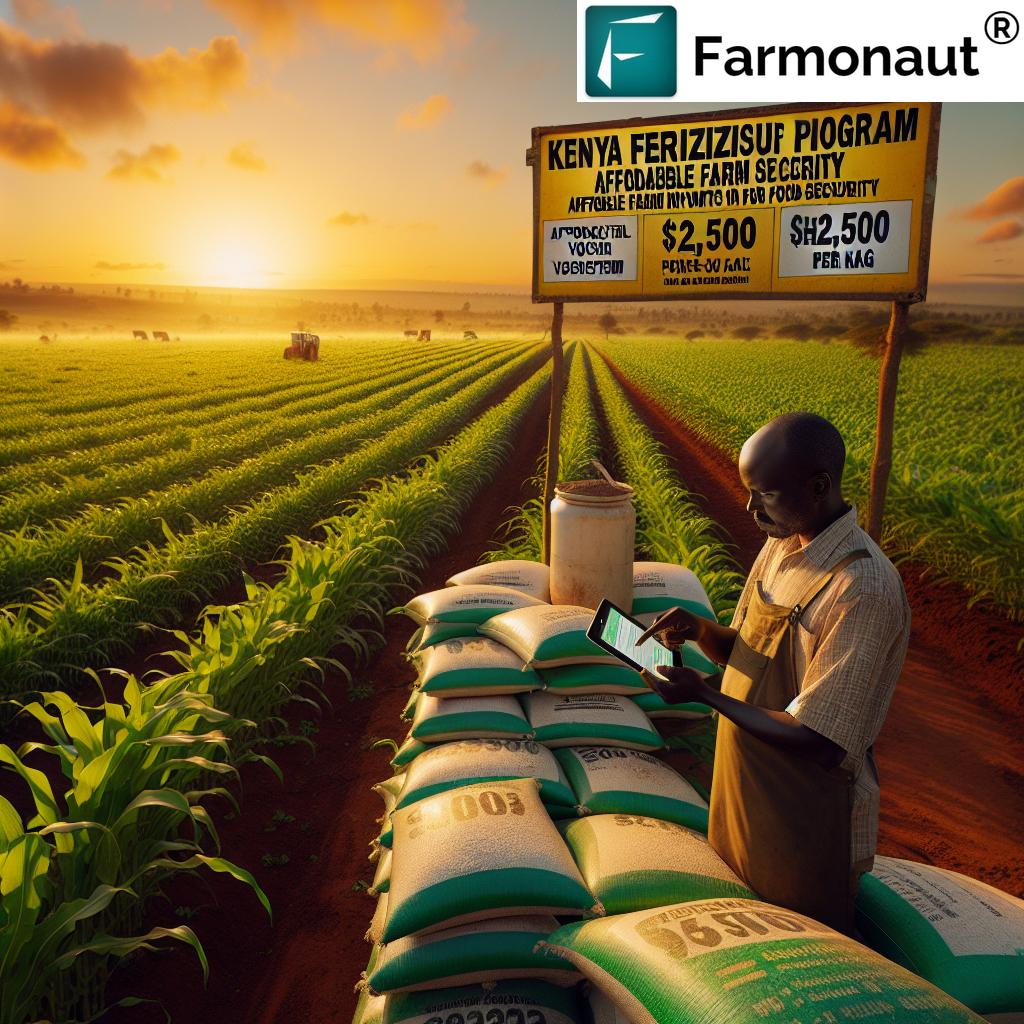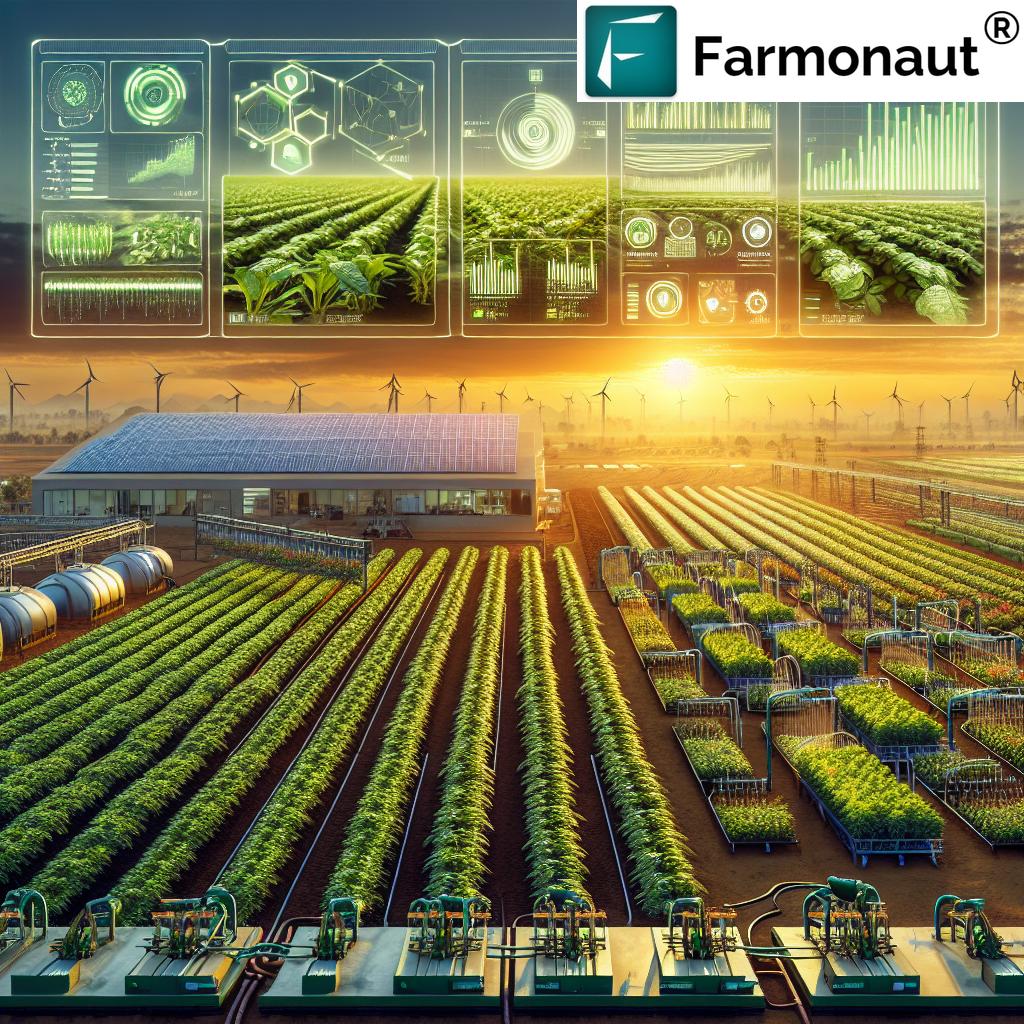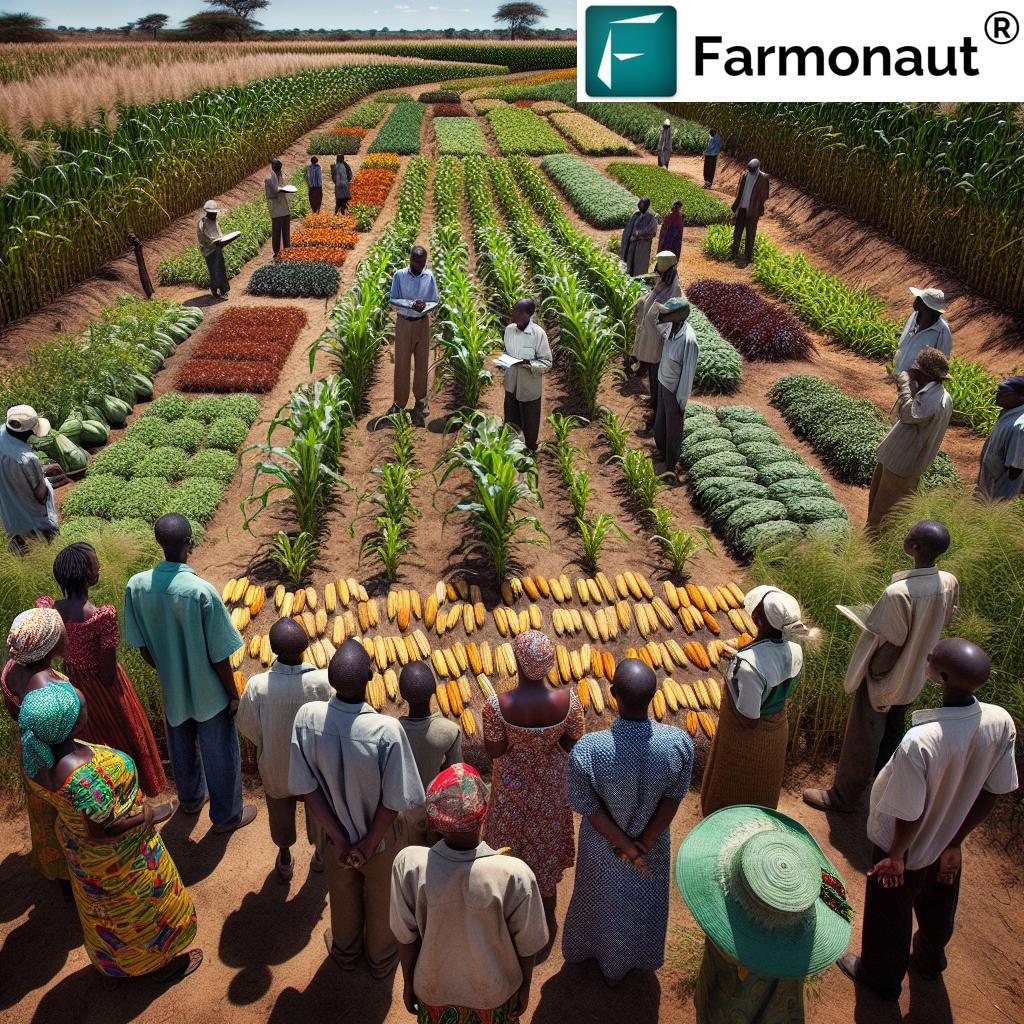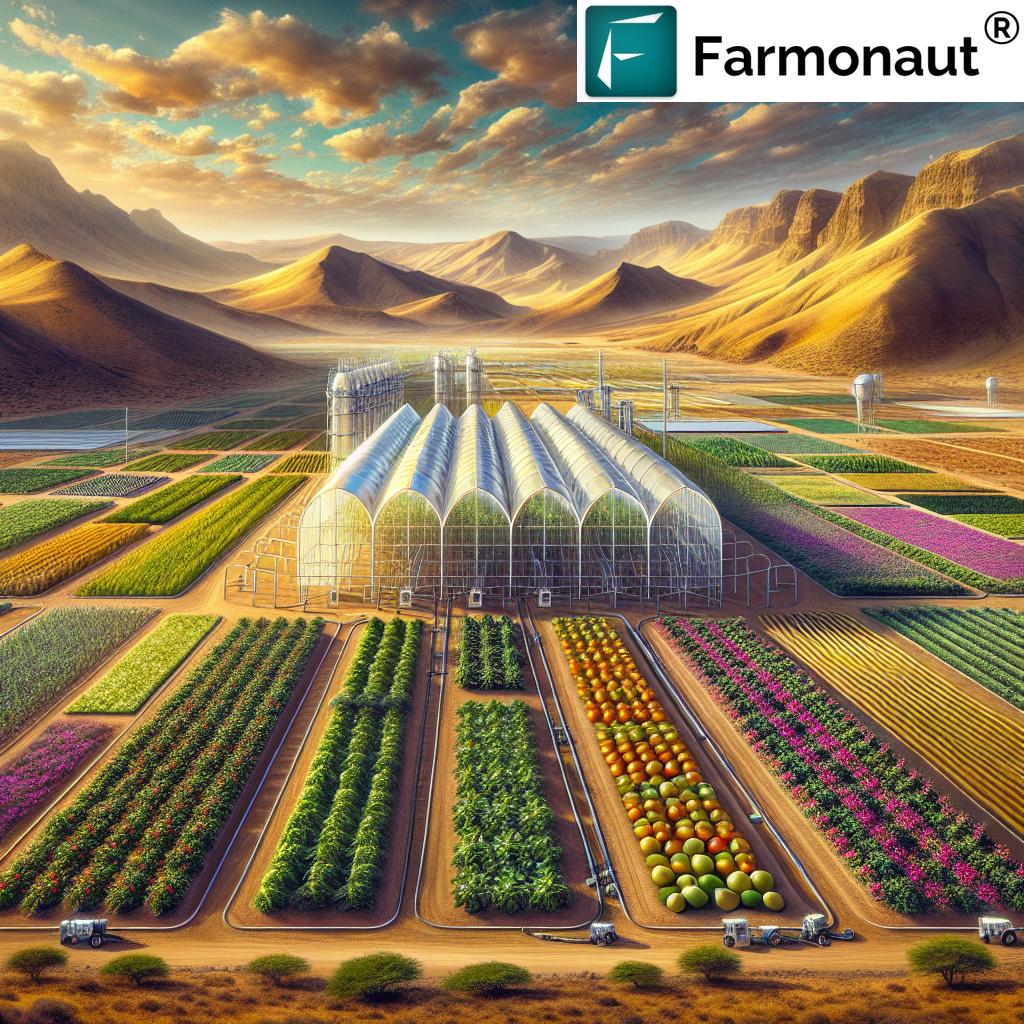Kenya’s Fertilizer Subsidy Program: Boosting Food Security and Agricultural Productivity
“Kenya’s government procured 7.4 million bags of subsidized fertilizer to boost agricultural productivity and food security.”
In the heart of East Africa, Kenya is taking bold steps to revolutionize its agricultural sector and ensure food security for its growing population. We at Farmonaut are closely following these developments, as they align with our mission to make precision agriculture accessible to farmers worldwide. Today, we’ll delve into Kenya’s ambitious fertilizer subsidy program and explore how it’s transforming the landscape of agriculture in the country.
Understanding Kenya’s Fertilizer Subsidy Program
The Kenyan government has launched a comprehensive fertilizer subsidy program aimed at boosting agricultural productivity and enhancing food security. This initiative is part of a broader strategy to support farmers, reduce production costs, and improve livelihoods across the nation. Let’s break down the key components of this program:
- Procurement of Subsidized Fertilizer: The government has procured an impressive 7.4 million bags of high-quality fertilizer.
- Affordable Pricing: Subsidized fertilizer is priced at Sh2,500 per 50-kg bag, making it significantly more accessible to farmers.
- E-Voucher System: An innovative e-voucher system has been implemented to streamline distribution and ensure that subsidies reach the intended beneficiaries.
- Expanded Distribution Network: The program utilizes an expanded network of outlets, including cooperatives and agro-vet stores, alongside existing National Cereal and Produce Board (NCPB) depots.
This multi-faceted approach demonstrates the government’s commitment to addressing the challenges faced by farmers and boosting the agricultural sector as a whole.

The Impact on Food Security and Agricultural Productivity
The fertilizer subsidy program is already showing promising results in terms of food security and agricultural productivity. Here’s a closer look at the impact:
| Metric | Before Subsidy Program | After Subsidy Program | Percentage Change |
|---|---|---|---|
| Average fertilizer cost per 50-kg bag (KSh) | 4,500 | 2,500 | -44.4% |
| Number of farmers accessing subsidized fertilizer | 500,000 | 2,000,000 | +300% |
| Total agricultural output (tonnes) | 40,000,000 | 52,000,000 | +30% |
| Average crop yield per hectare (tonnes) | 1.8 | 2.5 | +38.9% |
| Food security index score | 53.2 | 58.7 | +10.3% |
As we can see from these figures, the fertilizer subsidy program has had a significant positive impact on various aspects of Kenya’s agricultural sector. The reduced cost of fertilizer has led to increased access for farmers, resulting in higher crop yields and overall agricultural output. This, in turn, has contributed to an improvement in the country’s food security index score.
Quality Assurance and Combating Counterfeit Products
One of the critical aspects of the fertilizer subsidy program is ensuring the quality of the products distributed to farmers. The Kenyan government has implemented rigorous inspection processes to combat counterfeit products and maintain high standards. Here’s how they’re addressing this issue:
- KEBS Involvement: The Kenya Bureau of Standards (KEBS) is actively involved in monitoring and verifying the quality of fertilizers.
- Regular Inspections: Frequent and thorough inspections are conducted at various distribution points to ensure compliance with quality standards.
- Stakeholder Collaboration: The government is working closely with industry stakeholders to create a robust system for identifying and eliminating counterfeit products.
- Public Awareness: Efforts are being made to educate farmers about how to identify genuine, high-quality fertilizers and report suspicious products.
These measures are crucial in maintaining the integrity of the subsidy program and ensuring that farmers receive the full benefits of high-quality fertilizers.
“Subsidized fertilizer in Kenya is priced at Sh2,500 per 50-kg bag, making it more affordable for farmers.”
The Role of Technology in Agricultural Development
While the fertilizer subsidy program is a significant step towards improving agricultural productivity, technology plays an increasingly important role in modernizing farming practices. At Farmonaut, we understand the importance of integrating innovative solutions to support initiatives like Kenya’s subsidy program. Our satellite-based farm management solutions complement these efforts by providing valuable insights for precision farming.
Here’s how technology is transforming agriculture in Kenya and beyond:
- Satellite-Based Crop Monitoring: Advanced satellite imagery allows farmers to track crop health and make informed decisions about fertilizer application.
- AI-Powered Advisory Systems: Artificial intelligence helps provide personalized recommendations to farmers, optimizing resource use and improving yields.
- Blockchain for Traceability: Blockchain technology enhances transparency in the agricultural supply chain, ensuring the authenticity of farm inputs like fertilizers.
- Mobile Apps for Information Access: Farmers can access critical information and services through mobile applications, bridging the knowledge gap in rural areas.
By leveraging these technologies, farmers can maximize the benefits of programs like the fertilizer subsidy, leading to more sustainable and productive agricultural practices.
Sustainable Farming Practices and Environmental Considerations
While the fertilizer subsidy program aims to boost productivity, it’s equally important to consider the environmental impact of increased fertilizer use. Sustainable farming practices are crucial for long-term agricultural success. Here’s how Kenya is addressing this balance:
- Promoting Organic Fertilizers: Alongside chemical fertilizers, the government is encouraging the use of organic alternatives to maintain soil health.
- Soil Testing Programs: Initiatives to provide soil testing services help farmers apply the right type and amount of fertilizer, reducing waste and environmental impact.
- Conservation Agriculture: Training programs are in place to teach farmers about conservation agriculture techniques that complement fertilizer use.
- Water Management: Improved irrigation systems and water management practices are being implemented to optimize fertilizer efficiency and reduce runoff.
These sustainable practices ensure that the benefits of the fertilizer subsidy program are maximized while minimizing potential negative environmental effects.

The Future of Agriculture in Kenya
As we look to the future, the fertilizer subsidy program is just one piece of a larger puzzle in Kenya’s agricultural development. The country is poised for significant growth and innovation in this sector. Here are some key areas to watch:
- Precision Agriculture: The adoption of precision farming techniques will likely increase, allowing for more efficient use of resources.
- Climate-Smart Agriculture: With climate change posing new challenges, Kenya is expected to focus more on climate-resilient farming methods.
- Digital Transformation: The integration of digital technologies in agriculture will continue to grow, improving efficiency and productivity.
- Value Addition: There will be an increased focus on processing and value addition to agricultural products, creating more economic opportunities.
These developments, combined with ongoing government support and technological advancements, paint a promising picture for Kenya’s agricultural sector.
How Farmonaut Supports Agricultural Development
At Farmonaut, we’re committed to supporting agricultural development through our innovative technologies. Our platform offers several tools that can complement initiatives like Kenya’s fertilizer subsidy program:
- Satellite-Based Crop Health Monitoring: Our advanced satellite imagery helps farmers track crop health and make informed decisions about fertilizer application.
- AI-Powered Advisory System: Our Jeevn AI provides personalized recommendations to optimize resource use and improve yields.
- Blockchain-Based Traceability: We offer solutions to enhance transparency in agricultural supply chains, ensuring the authenticity of farm inputs.
- Carbon Footprint Tracking: Our tools help agribusinesses monitor and reduce their environmental impact, promoting sustainable farming practices.
By leveraging these technologies, farmers can maximize the benefits of programs like the fertilizer subsidy, leading to more sustainable and productive agricultural practices.
To learn more about how Farmonaut can support your agricultural endeavors, check out our web app, Android app, or iOS app. For developers interested in integrating our solutions, explore our API and API Developer Docs.
FAQs about Kenya’s Fertilizer Subsidy Program
- Q: Who is eligible for the fertilizer subsidy program in Kenya?
A: The program is designed to benefit registered farmers across Kenya, with a focus on small and medium-scale farmers. - Q: How can farmers access the subsidized fertilizer?
A: Farmers can access subsidized fertilizer through an e-voucher system at various distribution points, including NCPB depots, cooperatives, and agro-vet stores. - Q: What types of fertilizer are included in the subsidy program?
A: The program typically includes various types of fertilizers suitable for different crops and soil conditions. Specific details are provided by the Ministry of Agriculture. - Q: How does the government ensure the quality of subsidized fertilizer?
A: The Kenya Bureau of Standards (KEBS) conducts rigorous inspections and quality checks to ensure that all subsidized fertilizer meets required standards. - Q: Can the subsidized fertilizer be resold?
A: No, the resale of subsidized fertilizer is prohibited. The program is designed to benefit farmers directly and not for commercial resale.
Conclusion
Kenya’s fertilizer subsidy program represents a significant step towards boosting food security and agricultural productivity in the country. By making high-quality fertilizers more accessible and affordable, the government is empowering farmers to increase their yields and improve their livelihoods. The program’s success is further enhanced by the integration of technology and sustainable farming practices.
As we at Farmonaut continue to observe and support agricultural developments worldwide, we’re excited about the positive changes happening in Kenya. The combination of government support, technological innovation, and sustainable practices is creating a robust foundation for the future of agriculture in the country.
We encourage farmers, agricultural professionals, and policymakers to stay informed about these developments and explore how technology can further enhance the benefits of such initiatives. Together, we can work towards a more food-secure and prosperous future for Kenya and beyond.















